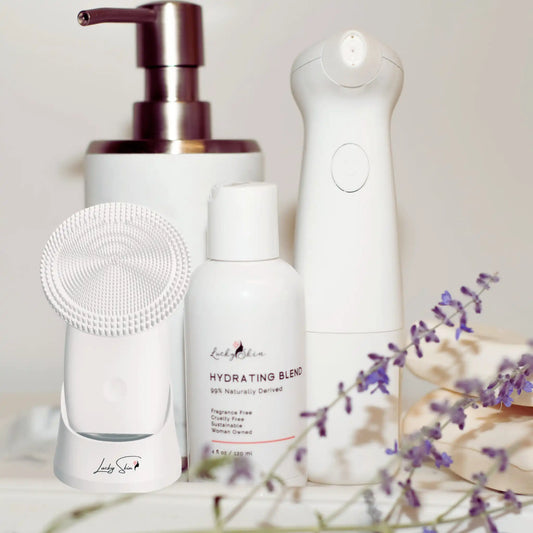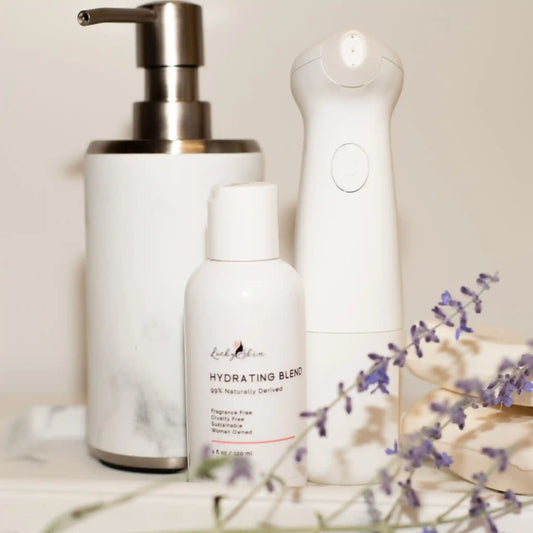Which skin care products should I use?
Share
Which skin care products should I use? The Ultimate Guide
Are you overwhelmed by the endless options of skin care products on the market? Do you find yourself standing in the beauty aisle, unsure of which products are right for your skin and constantly thinking which skin care products should I use? Look no further, as we have compiled the ultimate guide to help you choose the best skin care products to answer the question, "which skin care products should I use?"
Understanding Your Skin Type
Before diving into the world of skin care products, it's essential to understand your skin type. There are five main skin types: normal, dry, oily, combination, and sensitive. Each skin type has its own set of characteristics and requires specific products to address its unique needs.
- Normal Skin: If your skin is well-balanced, not too oily or too dry, consider yourself lucky! Normal skin types can generally use a wide range of products without experiencing sensitivity.
- Dry Skin: If your skin feels tight, flaky, or itchy, you likely have dry skin. Look for hydrating products that contain ingredients like hyaluronic acid, glycerin, and ceramides.
- Oily Skin: Shiny T-zone and frequent breakouts are common signs of oily skin. Opt for oil-free, non-comedogenic products that can help control excess oil production.
- Combination Skin: Combination skin features both oily and dry areas, typically an oily T-zone and dry cheeks. Use a gentle cleanser and products targeted for both skin types.
- Sensitive Skin: Easily irritated, red, or itchy skin indicates sensitivity. Look for fragrance-free, hypoallergenic products with soothing ingredients like aloe vera and chamomile.
Selecting Skin Care Products based on Ingredients
In a world filled with endless options of skin care products, it can be overwhelming to navigate through the shelves and trying to figure out which skin care products should I use. However, one of the most crucial factors to consider when selecting skin care products is the ingredients listed on the packaging. The ingredients play a significant role in determining the effectiveness of the product and how it will address your specific skin concerns.
Why Skin Care Product Ingredients Matter
Just like how you pay close attention to the ingredients in the food you consume, it's essential to do the same for the products you apply to your skin. Your skin is the largest organ in your body, and it absorbs whatever you put on it. Therefore, selecting products with the right ingredients can make a world of difference in improving your skin's health and appearance.
Key Skin Care Product Ingredients to Look For
Retinol
Retinol is a derivative of vitamin A, a potent antioxidant that is crucial for maintaining healthy skin. It belongs to a class of compounds known as retinoids, which are widely used in skincare products due to their proven benefits. Retinol is prized for its ability to accelerate cell turnover, stimulate collagen production, and improve skin texture and tone.
How Does Retinol Benefit the Skin?
Anti-Aging Properties:
Retinol is revered for its powerful anti-aging properties. By stimulating collagen production, it helps to reduce the appearance of fine lines and wrinkles, resulting in smoother, firmer skin. It also aids in improving skin elasticity, making it a key ingredient in the fight against aging.
Treats Acne:
Retinol is also effective in treating acne, thanks to its exfoliating properties. By unclogging pores and reducing inflammation, it helps to prevent breakouts and keep acne at bay. It can also help to fade acne scars and hyperpigmentation, giving you clearer, more even-toned skin.
Vitamin C
In the quest for flawless and radiant skin, one key ingredient that has been making waves in the skincare world is Vitamin C. This powerful antioxidant not only boosts our immune system but also plays a crucial role in skincare by promoting collagen production, protecting against UV damage, and brightening the complexion.
Vitamin C, also known as ascorbic acid, is a water-soluble vitamin found in various fruits and vegetables. It is renowned for its antioxidant properties, which help combat free radicals that can cause premature aging and skin damage.
Benefits of Vitamin C for the Skin
Collagen Production:
Collagen is a protein that provides structure and elasticity to the skin. Vitamin C stimulates collagen synthesis, helping to improve skin firmness and reduce the appearance of fine lines and wrinkles.
Protection Against UV Damage:
Exposure to UV radiation can lead to skin damage and premature aging. Vitamin C acts as a powerful antioxidant, protecting the skin from UV-induced free radicals and reducing the risk of sunburn.
Brightening the Complexion:
Vitamin C inhibits the production of melanin, the pigment responsible for dark spots and hyperpigmentation. By reducing melanin production, Vitamin C helps to brighten the skin and even out skin tone.
Enhanced Hydration:
Vitamin C plays a role in maintaining the skin's natural moisture barrier, preventing water loss and promoting hydration. This can result in plumper, more supple skin.
Niacinamide
In the realm of skincare ingredients, one particular powerhouse seems to be stealing the spotlight - niacinamide. But what exactly is niacinamide, and how can it benefit your skin? Let's delve into the world of this skin-loving compound and discover the wonders it can do for your complexion. Niacinamide, also known as vitamin B3 or nicotinamide, is a water-soluble vitamin that plays a vital role in maintaining overall skin health. It is a versatile ingredient that offers a multitude of benefits for various skin types and concerns. From brightening and hydrating to reducing inflammation and minimizing the appearance of pores, niacinamide is a true multitasker in the world of skincare.
The Benefits of Niacinamide for Skin
Brightens Skin Tone
Niacinamide is hailed for its ability to even out skin tone and fade dark spots and hyperpigmentation. By inhibiting the transfer of melanin to the skin's surface, niacinamide can help brighten dull and uneven skin, leaving you with a radiant complexion.
Hydrates and Moisturizes
This powerhouse ingredient also works wonders when it comes to hydrating and moisturizing the skin. Niacinamide helps strengthen the skin's natural barrier, locking in moisture and preventing water loss. This can lead to plumper, more supple skin that looks and feels healthy.
Reduces Inflammation
If you struggle with redness, acne, or other inflammatory skin conditions, niacinamide might be your new best friend. Its anti-inflammatory properties can help calm and soothe irritated skin, reducing redness and promoting a more balanced complexion.
Minimizes Pore Size
Enlarged pores are a common skincare concern for many people. Niacinamide can help tighten and refine pores, giving the skin a smoother appearance and reducing the risk of clogging and congestion.
Ceramides
Ceramides are a type of lipid molecule that naturally occur in the outermost layer of our skin, known as the stratum corneum. They play a crucial role in maintaining the skin's barrier function, which is essential for keeping our skin healthy and hydrated. In simple terms, ceramides act as the "glue" that holds our skin cells together, preventing moisture loss and protecting our skin from external aggressors.
Benefits of Ceramides for Skin
Hydration:
Ceramides help to lock in moisture and prevent water loss, keeping the skin hydrated and plump.
Repair:
Ceramides aid in repairing the skin barrier, reducing redness, inflammation, and sensitivity.
Protection:
By fortifying the skin's barrier, ceramides protect against pollutants, UV rays, and other external aggressors.
Anti-Aging:
Ceramides support the skin's natural renewal process, reducing the appearance of fine lines and wrinkles.




